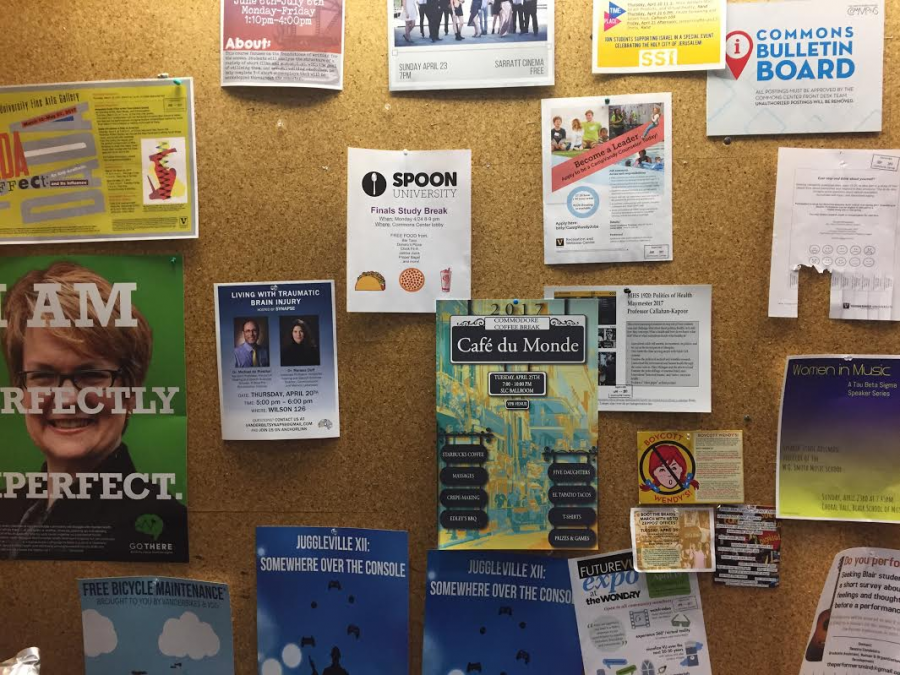This past week, a Vanderbilt student could have attended 102 events on campus, which averages out to approximately 14.6 events every day. This only includes programs that were added to the Anchorlink master calendar for April 16th to the 23rd – which means that there may have been more that actually took place. The sheer number of events on Vanderbilt’s campus raises the question: does the school have an over-programing problem?
The numbers suggest so. The 2016-17 school year calendar, not including winter break, lists a total of 4,626 events. This averages to an overwhelming 19.3 events every day from August 20 to May 6. The month with highest number of events was October, with 776. The month with the highest number of events per day was September, with an average of 25.6. While The Hustler does not have concrete data on how often students attend campus programming, it is certainly nowhere near 179 events per week. Furthermore, the Anchorlink home page advertises that, “there are over 923 ways to get involved,” referring to the total of 923 organizations currently active on the site. Consistent commitment to a mere dozen extra-curriculars is extremely time-consuming, though. Just the thought of 923 is enough to make one’s calendar melt.
Given this information, one has to wonder: why do we have so much programming, and what are the implications of such a packed campus calendar? The incoming and outgoing Vanderbilt Student Government presidents both weighed in on the issue.
Outgoing VSG President Ariana Fowler explained that while she thinks niche clubs and activities are important, too often people start clubs that do the same thing as existing ones.
“What you have now is people wanting to say that they started a club – I see it as more of an ego issue,” she said, adding that community service is a big area where there are too many organizations with the same mission and type of events. “Just the fact that there are like ten or so programs that tutor kids… You could pool the resources and have one really effective mentorship program.”
New president Jami Cox attributed the dilemma to a different cause.
“Over-programming is certainly a problem, but it is a symptom of a much larger issue: a lack of communication between student organizations.”
No matter what the cause, the result is the same: a ridiculous amount of programming. So what does that mean for Vanderbilt students? First of all, there are the quantifiable implications.
“The Acfee pool isn’t getting any larger, but the number of clubs is still growing. So clubs are starting to get less and less money, which is going to make them less and less effective,” said Fowler.
More interesting, though, there may be psychological consequences. It’s possible that the high number of events on campus actually discourages students from attending more programs, according to Cox.
“The problem for Vanderbilt students arises when there are just too many programs for students to choose from,” said Cox.
Empirical studies back up her statement, and suggest that the more options a person has, the less likely he or she is to use any of them.
A study published by psychologists Sheena Iyengar and Mark Lepper in 2000 analyzed what happens when a consumer is offered too many choices. As described in the Harvard Business Review, the participants were either given 24 jams to sample or six. Thirty percent of those who were given fewer choices purchased a product, while only three percent of those given more choices did. Their data has been applied more broadly than grocery purchases, though. Further reports have reinforced the conclusion that the more options there are, the less likely individuals are to choose anything at all.
When this research is applied to Vanderbilt’s situation, it logically follows that the vast number of programs offered on a daily basis are overwhelming to students. We may be attending fewer events simply because our choices are so many.
Fowler offers a possible solution to the over-programming epidemic at Vanderbilt.
“We need some sort of council that guides organizations. When an organization comes to register, they can say, ‘We already have 60 mentoring groups’ and direct those students to an existing one. It could also suggest that certain existing groups merge.”
She explains that this type of council is common at other 4-year colleges.
It doesn’t appear that such a group will be established at Vanderbilt anytime soon, though. For now, it will remain the responsibility of students to identify and combat this issue. Cox agreed with this assessment.
“It is up to campus leaders to find these overlaps and collaborate when possible,” she said.











